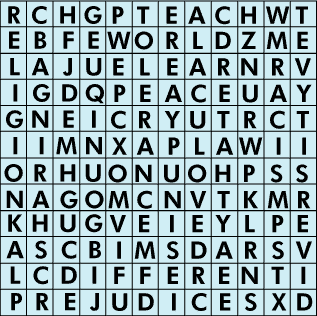Learning About Tolerance:
The dictionary says that tolerance means:
“The capacity for or practice of recognizing and respecting the opinions, practices, or behavior of others.”
Tolerance also means:
“To celebrate and appreciate each person’s unique differences!”
Other related definitions and examples:
• Prejudice – A negative, irrational attitude toward a group of people. Negative judgment without basis. For example, “I don’t trust him because he is tall.”
• Stereotype – The belief that all people in a certain group have common characteristics and behaviors. For example, “All tall people are lazy/greedy/bad.”
• Scapegoating – The transfer of shame, fear, and suffering from one group to another and the acting out of aggression on that group. For example, the Nazis scapegoated the Jews.
Word Find!

Find These Words in the Picture Above!
| Tolerance | Diversity | Culture |
| Genocide | Racism | Peace |
| Love | World | Hug |
| Hate | Prejudice | Teach |
| Different | Religion | Learn |
| Unique | Sharing | Try |
True or False Questions:
Which of these questions is true? Which is false? Do you know?
| 1. Boys are better at math than girls. | True or False |
| 2. The U. S. has no official religion. | True or False |
| 3. Only girls write in diaries. | True or False |
| 4. People in wheelchairs can win races. | True or False |
| 5. All people from Germany look alike. | True or False |
| 6. Kids can change the world. | True or False |
Stereotype Matching:
Match the following groups of people with their stereotypes.
A stereotype is a belief that all members of a group of people act the same way. Do you have stereotypes about any of these groups of people?
| 1. Old people | A. think they know everything |
| 2. Parents | B. are not very smart |
| 3. Boys | C. are boring and crabby |
| 4. Teens | D. like to fight with each other |
| 5. Girls | E. don’t understand kids |
| 6. Cheerleaders | F. don’t like bugs or snakes |
| 7. Teachers | G. don’t understand parents |
Decision Trees:
Now that you have learned more about the importance of tolerance, put your knowledge to the test and see how you respond in two imaginary situations. Click on the image of the tree to see two Decision Trees.
Learning Game Answers:
Want to know the answer to the learning games on this page? Click on the Question Mark!

